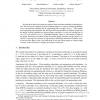Free Online Productivity Tools
i2Speak
i2Symbol
i2OCR
iTex2Img
iWeb2Print
iWeb2Shot
i2Type
iPdf2Split
iPdf2Merge
i2Bopomofo
i2Arabic
i2Style
i2Image
i2PDF
iLatex2Rtf
Sci2ools
107
click to vote
STACS
2004
Springer
2004
Springer
Matching Algorithms Are Fast in Sparse Random Graphs
We present an improved average case analysis of the maximum cardinality matching problem. We show that in a bipartite or general random graph on n vertices, with high probability every non-maximum matching has an augmenting path of length O(log n). This implies that augmenting path algorithms like the Hopcroft–Karp algorithm for bipartite graphs and the Micali–Vazirani algorithm for general graphs, which have a worst case running time of O(m √ n), run in time O(m log n) with high probability, where m is the number of edges in the graph. Motwani proved these results for random graphs when the average degree is at least ln(n) [Average Case Analysis of Algorithms for Matchings and Related Problems, Journal of the ACM, 41(6), 1994]. Our results hold, if only the average degree is a large enough constant. At the same time we simplify the analysis of Motwani.
Augmenting Path | Average Case Analysis | Random Graphs | STACS 2004 | Theoretical Computer Science |
Related Content
| Added | 02 Jul 2010 |
| Updated | 02 Jul 2010 |
| Type | Conference |
| Year | 2004 |
| Where | STACS |
| Authors | Holger Bast, Kurt Mehlhorn, Guido Schäfer, Hisao Tamaki |
Comments (0)

